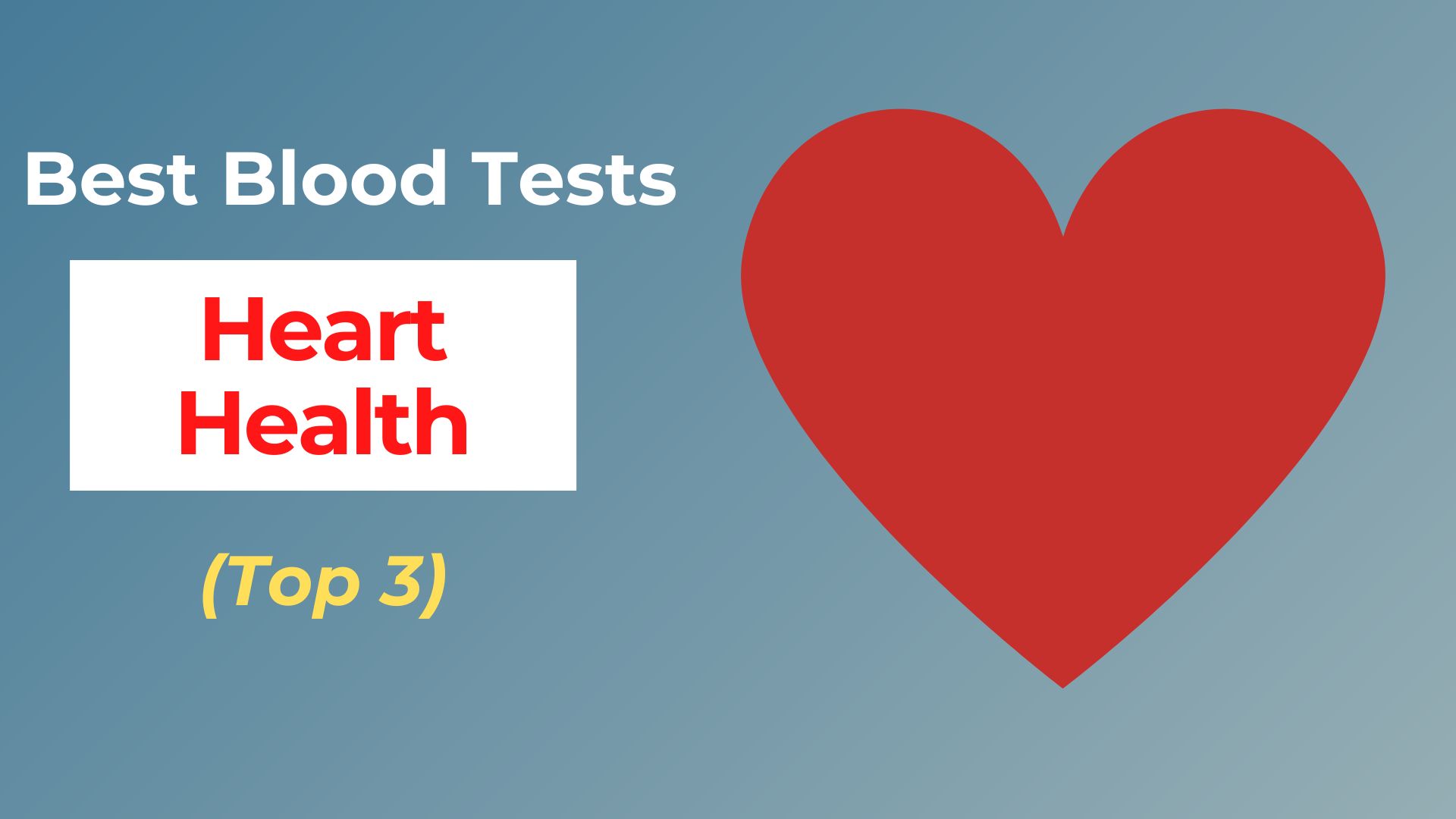Heart disease is the leading cause of death for both men and women in the United States, accounting for one in every four deaths.
That’s why it’s so important to be proactive about your heart health and get regular screenings.
One of the best ways to do that is by getting blood tests done regularly. In this article, we will discuss three of the best blood tests for heart health.
Please be advised that it is always best to consult with your doctor first for official medical advice.
They could assist you in covering the expenses of blood tests if you have insurance, and hopefully without too much paperwork.
If you’re just looking to order a blood test for heart health online so you can get a fast blood draw from the lab closest to you, keep reading!
We may receive a small commission if you order using some, but not all, of the links below. This helps keep the Eating Enlightenment CBT Food Journal App free for it’s hundreds of users.
Criteria For Best Blood Test for Heart Health
Test for Major Markers of Heart Health:
Major markers of heart health include lipids (cholesterol) and c-reactive protein (inflammation).
As heart disease is the leading cause of death, we’ve placed less emphasis on price and more emphasis on comprehensive testing. So if you’re wondering, when do I need a cardiac device, this article may help as well given the results of a blood test.
Certified Labs:
We chose blood test suppliers that had been certified by the Clinical Laboratory Improvement Amendments (CLIA). For each service, we took into account third-party evaluations as well as Better Business Bureau scores.
Convenience:
We looked for websites that provided complete explanations of tests, offered results in an easy-to-understand format, allowed you to track health changes as you ordered more tests, and delivered fast outcomes.
Best Overall: Ulta Wellness

- Price = $64
- # of Labs in US = 2000
- # of Reviews = 2728
- Average Rating = 4.9/5
- Better Business Bureau Rating = A+
The Better Business Bureau has given Ulta Wellness an A+ rating. Ulta Wellness has been accredited for eight years.
They’ve only had two complaints in the last 8 years, both of which were handled.
Ulta Wellness offers a “Heart Health #1 Baseline Blood Test Panel” which includes:
- Comprehensive Metabolic Panel (21 biomarkers)
- Cholesterol (Lipid) Profile
- C-Reactive Protein
These tests are considered the standard for evaluating heart health and risk of heart disease. With the lowest price and a stellar reputation, Ulta Wellness is our top overall choice.
Close Second: Walk-In Lab

- Price = $69-$89
- # of Labs in US = 3700
- # of Reviews = 16,605
- Average Rating = 4.8/5
- Better Business Bureau Rating = A
After more than 12 years of accreditation, the Walk-In Lab has an A rating from the Better Business Bureau (BBB).
Interestingly, the Walk-In Lab service is also termed a “Heart Health #1 Baseline Blood Test Panel”.
Walk-In Lab offers nearly the same service as Ulta Wellness. However, Ulta Wellness tests for 7 more metabolic biomarkers at a slightly cheaper price.
Yet, Walk-In Lab has more locations so this really is a close call.
Best For # Of Locations: Health Labs

- Price = $149
- # of Labs in US = 4500
- # of Reviews = 15,500
- Average Rating = 96%
- Better Business Bureau Rating = A+
After 11 years, the BBB has given Health Labs an A+ grade.
Also, lab locations at Health Labs are the most numerous of all blood testing services.
While Health Labs service is more expensive, Health Labs provides a more comprehensive test and measures:
- Lipid and Cholesterol Panel
- Comprehensive Metabolic Panel (14 Biomarkers)
- Routine Urinalysis
- Complete Blood Count
- C-Reactive Protein
Blood tests for heart disease
Your blood is a key indicator of your heart health. Each of the tests above looks at biomarkers in your blood to help determine the health of your heart as well as risk of heart disease or heart attack.
Plus, before you get your blood drawn, you’ll get your blood pressure taken too.
But what do these biomarkers mean in regards to heart disease risk, heart failure, etc? What do the above tests actually measure?
Lipid & Cholesterol test
A lipid and cholesterol test measures the fat in your blood.
This test is important for heart health because high levels of bad cholesterol (LDL) means your coronary arteries supplying blood may get clogged with cholesterol and fat.
If your blood vessels are clogged this can increase your risk for coronary artery disease, heart disease or heart attack.
The lipid and cholesterol test measures:
- total cholesterol
- HDL cholesterol
- LDL cholesterol
- triglycerides
C-Reactive Protein Test
The c-reactive protein (CRP) test measures inflammation in your body. Inflammation is one of the main risk factors and causes of a heart attack.
The CRP test is able to detect cardiovascular problems before they result in an abnormal heart rate.
High levels of CRP are associated with an increased risk for heart disease. Heart attacks and strokes are seen with excessively high CRP levels.
Comprehensive Metabolic Panel
The comprehensive metabolic panel (CMP) is a blood test that measures the function of your organs, including your heart.
This panel includes biomarkers which can give you a good overview of your overall health.
Some important things the CMP measures are:
- kidney function
- liver function
- blood sugar levels
- electrolytes
The comprehensive metabolic panel is a good test for overall health and can help identify problems with your heart.
Complete Blood Count
A complete blood count (CBC) measures the number and types of cells in your blood:
- red blood cells
- white blood cells
- platelets
- hemoglobin
This test is important for heart health because it can help identify anemia, a condition where you don’t have enough red blood cells.
Anemia can cause shortness of breath, fatigue, and chest pain. All of these are symptoms of heart disease.
Other Ways to Measure Heart Health
A blood test is a great way to measure your heart health. However, there are other tools that are helpful too.
Electrocardiogram
EKG’s (electrocardiograms), which check cardiac electrical activity, are the most common types of heart tests. They identify the numerous cardiac regions and can identify conditions that cause your blood pressure to fluctuate. The ECGs are unpleasant but only take around 5-10 seconds per test.
Chest X-rays
The function of the heart is to pump blood throughout the body. Heart failure is when your heart muscle can no longer pump blood.
The size and shape of the heart can be determined by chest x-rays, which can also identify cardiac issues, including risk of heart disease.
X-rays might provide your doctor with specialized medical information on your symptoms, which are frequently linked to both chest and heart problems, as well as revealing lungs that are vulnerable.
Magnetic Resonance Imaging (MRI)
An MRI machine is painless and utilizes magnetic waves to create pictures of the body’s heart and blood vessels in a scanner.
This aids in the detection of abnormalities in heart structure, heart muscle, and blood flow. This can be used to obtain images of individuals whose vessels and arteries are difficult to see using angiograms if they aren’t visible on x-ray or tomography
Of course, EKGs, x-rays, and MRIs need a doctor! It’s much easier to get a lab test!
Third Party Resources:
- Better Business Bureau for Ulta Wellness
- Better Business Bureau for Walk-In Labs
- Walkin Lab verified reviews
- Better Business Bureau for Health Labs
Conclusion
The best blood tests for heart health are a complete blood count, lipid and cholesterol test, and the c-reactive protein test.
Please be sure to add heart healthy foods to your daily diet as well.
These biomarkers measure inflammation in your body and how well your organs function, to help identify potential problems with your heart.
While there are other ways to measure heart health like an electrocardiogram or chest x-ray, these three lab test services listed above will provide you with basic information about what’s going on inside of your body without having to go through any more complex procedures.


